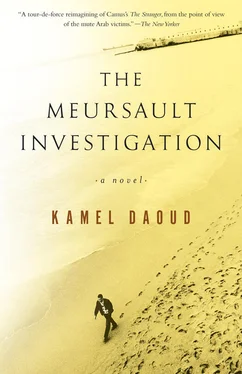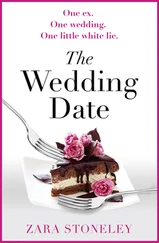They questioned me several times, but it was just so they could find out who I was, and the sessions never took very long.
At the police station, no one seemed to be interested in my case. Nevertheless, an officer in the Army of National Liberation eventually received me. He looked me over with curiosity and asked me several questions: name, address, occupation, date and place of birth. I answered politely. He was quiet for a moment, seemed to be looking for something in a notebook, and then he fixed his gaze on me again, this time with hardened eyes, and asked, “You know Monsieur Larquais?” I didn’t want to lie — I didn’t need to. I knew I wasn’t there for having committed a murder but for not having done so at the right moment. I’m summing it up like that to make it easier for you to understand. I gave a smart-ass reply: “Some people used to know him, I believe.” The man was young, but the war had aged him — unevenly, if I may say so. His face, now stiff and stern, was wrinkled in places, but I could tell he had some vigorous muscles under his shirt, and his skin showed the suntan people get when they have nothing but holes and maquis to hide in. He smiled at my attempt to evade him. “I’m not asking for the truth. Nobody needs that here. If it turns out you killed him, you’ll pay.” He burst out laughing. His laughter was big, powerful, booming, incredible. “Who would’ve thought I’d have to judge an Algerian for the murder of a Frenchman?” he asked between guffaws. He was right. As I well knew, I wasn’t there for having killed Joseph Larquais, nor would I be, not even if Joseph Larquais came there in person to accuse me, flanked by two witnesses and flaunting the two bullets I fired into his body in the palm of one hand, with his shirt rolled up under his armpits. I was there because I’d killed him all by myself, and for no good reason. “You understand?” the officer asked me. I said I did.
They brought me back to my cell so the officer could go to lunch. I did nothing and waited. I was sitting down, not thinking about very much. One leg lolled, as if posing, in a pool of sunlight. The skylight held the whole sky. I could hear distant conversations and the sounds of trees. I wondered what Mama was doing. She must surely be sweeping the courtyard, I thought, and conversing with all her family and friends. At two o’clock in the afternoon, the door opened and I was taken to the colonel’s office once again. He was waiting for me, calmly sitting under the huge Algerian flag that was hanging on the wall. A revolver lay on the corner of his desk. They had me sit on a chair, where I remained unmoving. The officer didn’t say anything, letting a heavy silence settle over us. I suppose he wanted to act on my nerves, to get me upset. I smiled, because that was a bit like the method Mama used when she wanted to punish me. “You’re twenty-seven,” he began, and then he leaned toward me with fire in his eyes, pointing an accusing finger. He shouted, “So why didn’t you take up arms to liberate your country? Answer me! Why?” His features struck me as vaguely comical. He stood up, violently yanked a drawer open, pulled out a little Algerian flag, came over to me, and waved it under my nose. In a threatening and rather nasal voice, he said, “Do you know what this is? Do you?” I replied, “Yes, of course.” Then he launched into a patriotic rant, reiterating his faith in his independent country and in the sacrifice made by one and a half million martyrs. “This Frenchman, you should have killed him with us, during the war, not last week!” I didn’t see what difference that made, I replied. Visibly taken aback, he was silent for a while, and then he roared, “It makes all the difference!” He gave me a dirty look. I asked what the difference was. He started stammering, declaring that killing and making war were not the same thing, that we weren’t murderers but liberators, that nobody had given me orders to kill that Frenchman, and that I should have done it before . “Before what?” I asked. “Before July 5! Yes, before, not after, damn it!” There were a few sharp raps on the door, and then a soldier entered and placed an envelope on the desk. This interruption seemed to exasperate the colonel. The soldier gave me a quick glance and withdrew. “Well?” the officer said. I replied that I didn’t understand, and I asked him, “If I killed Monsieur Larquais on the fifth of July at two o’clock in the morning, are we supposed to say the war was still going on, or had Independence already come? Was it before or after ?” The officer sprang up like a jack-in-the-box, reached out a surprisingly long arm, and dealt me a monumental slap in the face. I felt my cheek go icy cold, then fiery hot, and my eyes got involuntarily moist. I had to straighten my spine. After that, nothing happened. We remained where we were, both of us, face-to-face. The colonel’s arm slowly returned to its place by his side, and I probed the inside of my cheek with my tongue. We heard a voice in the corridor, and the officer used the opportunity to break the silence: “Is it true that your brother was killed by a Frenchman?” I said yes, but that was before the revolution broke out. The colonel suddenly looked very tired. “It should simply have been done before,” he murmured, almost pensively. “There are rules to obey,” he added, as if to convince himself of the soundness of his reasoning. He asked me to tell him again exactly what my occupation was. “I’m a government official. Land Administration,” I told him. “A useful profession for the nation,” he muttered, as though to himself. Then he asked me to tell him Musa’s story, but his mind seemed to be on something else. I told him what I knew, which is to say, not much. The officer listened to me distractedly and then concluded that my tale was a bit thin, not to say improbable. “Your brother’s a martyr, but you, I don’t know …” I found this way of putting it incredibly profound.
Somebody brought him a cup of coffee, and he dismissed me. As I was leaving the room, he rapped out, “We know all about you, you and all the others. Don’t forget that.” I didn’t know how to answer, so I didn’t say anything. Back in my cell, I started feeling chagrined. I knew I was going to be released, and the knowledge cooled the strange ardor boiling inside me. The walls seemed to close in, the skylight shrank, all my senses panicked. The night was going to be bad, dull, suffocating. I tried to think about pleasant things such as swans’ nests, but nothing worked. They were going to set me free without explanation, whereas I wanted to be sentenced. I wanted to be relieved of the heavy shadow that was turning my life into darkness. There was even something unjust about their letting me go like that, without explaining whether I was a criminal, a murderer, a dead man, a victim, or simply an undisciplined moron. I found their casual attitude toward my crime almost insulting. I had killed, the thought made me incredibly dizzy. Yet basically nobody had anything bad to say about that. Only the timing seemed to pose a vague problem. What negligence, what flippancy! Didn’t they see they were disqualifying my act, obliterating it, by treating it like that? The gratuitousness of Musa’s death was unconscionable. And now my revenge had just been struck down to the same level of insignificance!
The next day they released me, without a word, at dawn, the moment soldiers often choose for making a decision. Some suspicious djounoud were muttering behind my back, as if they were still in the underground even though the whole country belonged to them. They were young peasants from the mountains, and their eyes were hard. I think the colonel had decided that I was to live in the shame of my alleged cowardice. He believed I was going to suffer for it. He was, of course, wrong. Ha, ha! I’m still laughing about it today. He deluded himself totally, totally …
Читать дальше












